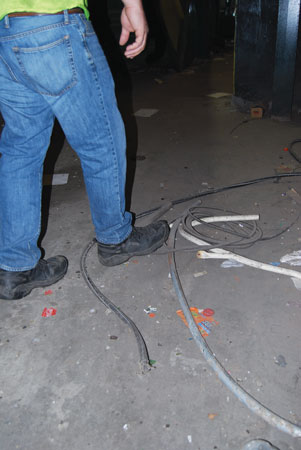According to OSHA, more than 65 percent of falls in the workplace are caused by a slip or trip. The other 35 percent of falls occur when workers fall off an object such as a ladder, loading dock or piece of equipment. Slips and trips can be prevented with good housekeeping, proper footwear and best practices to keep the workforce safe.
By Will Flower

Photos courtesy of Will Flower.
The average worker takes about 5,000 to 7,000 steps per day depending on their duties. A worker sorting material at a recycling center may take less steps than a helper on the back of a residential waste collection vehicle. However, every step could be a problem, especially in work environments that are cluttered with trip hazards.
Most slips are caused by wet, oily or greasy surfaces, weather hazards (including snow and ice), uneven walking surfaces or unsecure mats on the floor. Trips occur when a foot strikes an object, causing a worker to lose balance and potentially fall. Inside a recycling center or transfer station, the most common cause of tripping is poor housekeeping when objects such as wires, ropes or cords are left on the floor. The risk of a slip or trip will increase when a worker’s view is obstructed. On the collection route, workers risk slips and trips due to uneven roadways, cracks in the pavement, curbs, potholes, and wet or icy surfaces.
Reduce the Risk
Using common sense and carefully reviewing the workspace for potential slip and trip hazards will reduce the risk of injury from falls. Consider these safety tips:
- Good housekeeping—Keeping walkways and work areas clean and orderly will help reduce the risk of trips and slips. Spills should be immediately cleaned up. Wet floors should be identified as such using signage to warn employees of the potential hazard. Removing clutter including debris, boxes, cords, hoses, and wires from walkways and work spaces will reduce the potential for tripping.
- Make repairs when necessary—Broken floor tiles, worn out carpet, mats with turned up corners and rugs with tears and wrinkles should be replaced to prevent tripping. Uneven floors and broken stairs should be repaired.
- Improve visibility—Workers need to see where they are going. Review the work area to ensure lighting is adequate. Additionally, remind workers to take extra precautions when moving large objects that limit their vision of the walkway. When moving bulky items, consider getting additional help or use a cart or hand-truck to make the move safer.
- Use good ladders—Ladders should be inspected, and workers should be properly trained in the set up and use of ladders to avoid falls and injuries. Ladders should be placed on solid surfaces. Broken ladders should be immediately taken out of service and repaired or discarded.
- Three Points of Contact—Employees should use care when climbing in and out of a vehicle. Drivers and equipment operators should use the “Three Points of Contact” rule in which you use two hands and one foot, or one hand and two feet, to support your body while mounting or dismounting a vehicle. Never jump out of vehicle.
- Wear proper footwear—Wearing proper footwear with appropriate tread is one of the simplest ways to avoid slips. Workers who are outside and working in snow and icy conditions may require a different type of tread on a shoe or boot compared to a worker who works in areas where floors might be wet or oily. Look at the pattern on the outer sole which provides grip and is very important. If you work in wet or oily conditions, you will need a boot with a tread designs that tunnels water from under the boot and prevents a hydroplane. Flat edges or worn tread can sometimes create a wall that prevents liquid from moving away from under the shoe. Ideally you want more rubber hitting the floor and water dispersing rapidly every time a step is taken on a wet or oily surface.
Keep Your Team Safe
The risks of falls are real, regardless of title or job responsibilities. According to the Bureau of Labor Statistics, slips, trips and falls cause nearly 700 fatalities per year in the U.S. Worker education and safety training focused on precautions to avoid slips and trips will help keep the entire team safe at every step. | WA
Will Flower is the Senior Vice President of Corporate and Public Affairs at Winters Bros. Waste Systems. Will has 36 years of experience in the field of solid waste management and environmental protection. He has held operational and executive leadership positions at the Director’s Office of the Illinois Environmental Protection Agency, Waste Management, Inc., Republic Services. Inc. and Green Stream Recycling.
Share your safety tip. Submit your suggestions to Will Flower at [email protected]
